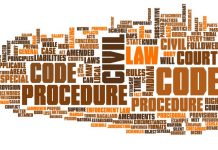This article is written by Priyanshi Soni, a student of Symbiosis Law School, Noida. This article seeks to analyze if it is important to commit ‘wilful’ disobedience of injunction to invoke Order 39 Rule 2A of CPC with a brief analysis of injunctions.
Table of Contents
Introduction
Civil Procedure Code of 1908 helps in regulating the civil courts’ procedures. One of the provisions mentioned herewith regarding injunction is that of disobedience of such injunction ordered by the Court. Injunctions are the temporary remedies given to the plaintiff with respect to the dispute of his claims, to prevent the defendant from disposing of the rights of the plaintiff, and disobedience of such an injunction can result in punitive actions.
Injunctions and their types
An injunction is a type of judicial and equitable remedy in which a party is granted relief by the court’s order. In this, the court directs the party to do or refrain from doing any specific act. If the party disobeys this order of the court, then heavy penalties are imposed and can even lead to imprisonment. The main objective of this remedy is to protect the property in dispute until the competing claims and rights are resolved before the court. Sections 94, 95, and Order 39 of the Civil Procedure Code specifically discuss injunctions, and also the temporary and perpetual injunctions are defined under Sections 36 to 42 of the Specific Relief Act, 1963. These injunctions help in protecting the property from future damage, violation of law, or infringement of intellectual property rights. An injunction can be filed by the defendant or plaintiff, but not by or against any third person.
Kinds of Injunctions
Injunctions are granted for a particular duration as decided by the court on the basis of the cases. The different kinds of Injunctions can be classified as –
Prohibitory injunction
This type of injunction is passed by the court to prevent the party from doing something which may hamper the legal right of the other. Thus, it is also called a preventive or restrictive injunction.
For example, “A” is a trespasser or wants to trespass into B’s premises so “B” can seek a prohibitory injunction to prevent him from trespassing.
Mandatory injunction
A mandatory injunction is granted by a court ordering the party to do something mandatory. The two things which are necessary for granting mandatory injunctions are – the defendant had an obligation that was not fulfilled earlier and the relief must be enforceable by the court.
Permanent or perpetual injunction
Section 39 of the Specific Relief Act, 1963 deals with the perpetual injunction. By this, the court can order the party to completely refrain from doing something forever. This injunction can only be granted after the final decree is given by the court and is decided based on merit. This is given at the discretion of the court.
Temporary Injunctions
A temporary injunction is granted by the court to temporarily restrict the defendant from causing any injury to the plaintiff’s property or threatening the plaintiff with dispossession or making any third party claim in it. This is a temporary relief issued to ensure that the plaintiff’s rights are not infringed upon. This injunction can be granted by the court before the disposal of the suit at any stage of the trial. Temporary Injunctions are governed by the Civil Procedure Code of 1908. Here are the provisions under CPC which govern this –
Section 94 – The purpose of this section is to keep the goal of justice from being defeated. Section 94(c) discusses giving temporary injunctions and, if the party is disobedient, can commit the person to civil prison or order that his property is attached and sold.
Section 95 – If the claim of the plaintiff is defeated, then the court can grant compensation to the defendant if he claims so.
Order XXXIX – Rule 1 of Order XXXIX mentions the ground on which a temporary injunction may be granted by the court. These are as follows –
- Any property in dispute is in danger of being damaged, squandered, alienated, or wrongfully sold in execution of a decree by any party to the suit.
- When the defendant threatens or wants to remove his property in order to cheat creditors.
- The defendant threatens to evict the plaintiff or otherwise harm the plaintiff in relation to any property in dispute in the suit.
Rule 2 stipulates that an interim injunction might be imposed to prevent the defendant from breaching the contract if any harm to the plaintiff is imminent. The plaintiff bears the burden of proving that the injunction should be enforced.
Order 39 Rule 2A of CPC
Order XXXIX CPC deals with the grant of temporary injunctions. Rule 1 deals with the cases in which temporary injunctions can be granted and Rule 2 is about granting an injunction to restrain repetition or continuance of breach. Rule 2A of the order the consequence of disobedience or breach of injunction as follows:
- In the case where there is disobedience shown in any injunction granted or other order ordered under Rule 1 or 2 or breach of any of the terms on which the injunction was granted or order made, the court can order that property of such a person can be attached and he can be sent to civil prison for a period not exceeding three months unless in the meantime the Court directs his release.
- Also, no attachment made under this rule shall remain in force beyond 1 year and if the breach continues, the court can allow that The attached property may be sold, and the court may award such compensation as it sees suitable to the injured party out of the revenues, and the rest, if any, shall be paid to the person entitled thereto.
Should disobedience of injunction be wilful to invoke Order 39A Rule 2A
In a recent case of Amazon v Future Retail (2021), a Supreme Court bench comprising Justices RF Nariman and BR Gavai made an important observation regarding if “mere” disobedience will suffice or it has to be ‘wilful disobedience’ of injunction to invoke Order 39A Rule 2A. This provision was interpreted in the Amazon by a single bench in an application filed by Amazon to enforce the award passed by the Emergency Arbitrator, which had issued a show-cause notice under Order XXXIX, Rule 2-A of the Code of Civil Procedure.
Background of the Amazon-Future Retail case
On March 18, a single bench of Justice JR Midha of the Delhi High Court granted Amazon’s petition for enforcement of the interim order dated October 25, 2020, passed by the Emergency Arbitrator under Section 17(2) of the Arbitration and Conciliation Act, 1996 read with Order XXXIX Rule 2A and Section 151 of the Code of Civil Procedure. The single bench determined that the ‘Emergency Award’ is enforceable under Indian law as an order for interim relief issued under Section 17(1) of the Arbitration Act. The single bench also used the term “group of companies” to hold that FRL and the Biyanis are subject to the Singapore award.
Significantly, as per the latest judgment, the Supreme Court has held, after appeal, that the emergency Award passed by the Singapore arbitrator stalling the FRL-Reliance deal is enforceable in Indian law, thus favouring Amazon.
Observations made by the Court
Remembering an old judgement on Food Corporation of India v. Sukh Deo Prasad (2009) the Court observed that the power of the court which Order 39A gives is punitive and so the court can punish in case of civil contempt under the Contempt of Courts Act, 1971.
In U.C. Surendranath, the bench of Justices R. Banumathi and AS Bopanna had observed thus: “For finding a person guilty of willful disobedience of the order under XXXIX Rule 2A C.P.C. there has to be not mere “disobedience” but it should be a “willful disobedience”. The allegation of willful disobedience being in the nature of criminal liability, the same has to be proved to the satisfaction of the court that the disobedience was not mere “disobedience” but a “willful disobedience” and that the allegation of willful disobedience being in the nature of criminal liability the same has to be proved to the satisfaction of the court that the disobedience was not mere ‘disobedience’ but ‘willful disobedience.
Now recently, doubting this decision, the Court says that it is doubtful regarding if “willful” disobedience is necessary to analyze the case or not. So the court has asked for a review of this by a larger bench. Suffice it to say that there is a vast difference between the enforcement of orders passed under Order XXXIX, Rules 1 and 2, and orders made in contempt of court.
Conclusion
Rule 2A, which was added by the Amendment Act of 1976, deals with severe consequences for disobeying or breaching a civil court order of injunction. The power granted by this clause is similar to the civil contempt jurisdiction. There has been confusion regarding disobedience of the injunction whether it should be willful or not, this question was answered earlier but now again, the doubt is raised by the Court in this matter.
References
- https://www.livelaw.in/top-stories/supreme-court-disobedience-injunction-wilful-order-39-rule-2a-cpc-doubts-179056
- https://www.livelaw.in/top-stories/supreme-court-rules-in-favour-of-amazon-in-case-against-future-retail-emergency-award-enforceable-in-indian-law-178981
- https://taxguru.in/corporate-law/types-injuctions-specific-relief-act-1963.html
- https://www.writinglaw.com/order-39-rule-2a-cpc/
- https://taxguru.in/corporate-law/cpc-constructive-notice-held-sufficient-willful-disobedience-proved-doubt-court-proceed-surmises-inferences.html?amp
- https://www.legalserviceindia.com/legal/article-1831-injunctions-summed-up.html
LawSikho has created a telegram group for exchanging legal knowledge, referrals, and various opportunities. You can click on this link and join:
https://t.me/joinchat/J_0YrBa4IBSHdpuTfQO_sA
Follow us on Instagram and subscribe to our YouTube channel for more amazing legal content.
 Serato DJ Crack 2025Serato DJ PRO Crack
Serato DJ Crack 2025Serato DJ PRO Crack










 Allow notifications
Allow notifications


